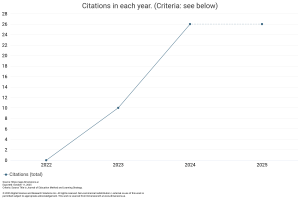Learning Model Integration Teams Games Tournament (TGT) and Gaming Media Uno Stacko to Social Studies Learning Outcomes In the classroom V Elementary School 2 Bahonsuai
DOI:
https://doi.org/10.59653/jemls.v2i02.810Keywords:
Integration, Teams Games Tournament, Learning Model, Uno Stacko Game Media, Learning OutcomesAbstract
Education is very important capital in development a country of use obtain source Power quality human being, because through arrangement good educationwill produce good graduates too. Thereforethat’s an increase quality education also means improvement quality source Power man. As for the formula problem Does the integration of the Teams Games Torunemaent (TGT) model and the Uno Stacko game media have an effect on social studies learning outcomes for class V of SD Negeri 2 Bahonsuai, objectives study Based on formulation the problem above so objective study namely to find out the integration of the Teams Games Torunemaent (TGT) model and the Uno Stacko game media which influences the social studies learning outcomes for class V SD Negeri 2 Bahonsuai, method This research is a type of quantitative research with experimental methods, results study The research instrument test is used to determine the level of validity, reliability, level of difficulty and distinguishing power of the questions. Before examining the average similarity between the two classes using independent sample t-test analysis, a normality test, homogeneity test, and N-Gain test are needed first. After carrying out the normality test, homogeneity test, and N-Gain test in both classes, the data was sufficient to carry out hypothesis testing.
Downloads
References
Aditya, UB (nd). Implementation of Teams Games Tournament for Increase Skills Collaboration Class Students Elementary school. Journal of Education and Culture, 14 (1).
Alfianita, R. (2024). MAXIMIZING CRITICAL THINKING SKILLS USING THE PROBLEM EXAMPLE GAMES TOURNAMENT MODEL AT SDN TELAWANG 1 BANJARMASIN. 7.
Azizah, A., Tatang, T., Saleh, N., & Nurmala, M. (2024). Collaborative Learning through Inside Outside Circle (IOC)- Post to Post Game in 21st Century Mufradat Learning. Edumaspul : Journal of Education, 8 (1), 307–318. https://doi.org/10.33487/edumaspul.v8i1.7631
Magdalena, I., Kadziyah, S., & Rosiha, S. (2023). CONCEPT OF ELEMENTARY SCHOOL LEARNING DESIGN MODELS. 2.
Misnawati, M. (2024). BIPA Innovative Study Through Central HISKI Webinar 27 December 2023. Journal Scientific Cage Tingang, 15 (1), 41–51. https://doi.org/10.37304/jikt.v15i1.294
Moutawaqil, NE, & Wibawa, S. (2024). GAMPEL REYEK'S LEARNING MODEL (OBSERVE, LEARN, PRACTICE, REFLECT, AND PROJECT) IN A DIFFERENTIATION USING THE TPACK APPROACH TO PPKN LEARNING. 09.
Riyadi, T., & Zulfiati, HM (2024). EXPLORATION OF THE POTENTIAL OF GAME-BASED LEARNING IN IMPROVING CLASS 5 SCIENCE LEARNING ACHIEVEMENT IN PRIMARY SCHOOLS. 09.
Rosadi, Y., Razak, A., & Hidayah, MU (2024). EFFECTIVENESS OF THE JIGSAW LEARNING MODEL IN MANAGING ACTIVE PARTICIPATION OF CLASS IV STUDENTS IN SCIENCE LEARNING AT MI AR RAUDHAH SAMARINDA. 1.
Siti Muntamah, B., & Fardana N, NA (2024). GROWING CREATIVITY WITH LEARNING MODELS: LITERATURE REVIEW. Scholaria : Journal of Education and Culture, 14 (01), 46–58. https://doi.org/10.24246/j.js.2024.v14.i01.p46-58
Downloads
Published
How to Cite
Issue
Section
License
Copyright (c) 2024 Ine Mariam, Hasan, Idrus

This work is licensed under a Creative Commons Attribution-ShareAlike 4.0 International License.
Authors who publish with this journal agree to the following terms:
- Authors retain copyright and grant the journal right of first publication with the work simultaneously licensed under a Creative Commons Attribution-ShareAlike that allows others to share the work with an acknowledgement of the work's authorship and initial publication in this journal.
- Authors are able to enter into separate, additional contractual arrangements for the non-exclusive distribution of the journal's published version of the work (e.g., post it to an institutional repository or publish it in a book), with an acknowledgement of its initial publication in this journal.
- Authors are permitted and encouraged to post their work online (e.g., in institutional repositories or on their website) prior to and during the submission process, as it can lead to productive exchanges, as well as earlier and greater citation of published work (See The Effect of Open Access).
























